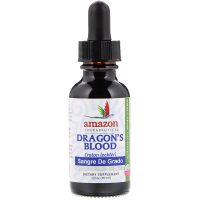Sangre de Grado
From Wikiwel
(Redirected from Blood of the Dragon)
Other Names: Blood of the Dragon, Croton lechleri, Drago, Dragon's Blood, Lan-Hiqui, Laniqui, Sang de Dragon, Sangre de Drago, Sangre de Dragon, Sangue de Agua, Sangue de Drago, SP 303, SP-303, Taspine.
Sangre de Grado is a tree that grows in the Amazon region of South America. The tree bark and sap are used to make medicine.
Contents
Special Precautions of Sangre de Grado
- Sangre de Grado appears to be safe for most people. When applied to the skin, Sangre de Grado can cause pain, burning, and scarring.
- Pregnancy and breast-feeding: Not enough is known about the use of Sangre de Grado during pregnancy and breast-feeding. Stay on the safe side and avoid use.
- A type of blood cancer called leukemia: Sangre de Grado might make this condition worse. Avoid using Sangre de Grado if you have leukemia.
Benefits and uses of Sangre de Grado are
- AIDS-related diarrhea. Taking a Sangre de Grado extract that contains the chemical SP-303 (SB-Normal Stool Formula, ShamanBotanicals.com) seems to reduce stool weight and frequency in people with AIDS-related diarrhea.
- Traveler's diarrhea. Taking a Sangre de Grado extract that contains the chemical SP-303 seems to be effective for treating symptoms of traveler's diarrhea.
- Treatment of herpes outbreaks (genital and anal) in people with AIDS. Applying a Sangre de Grado extract that contains the chemical SP-303 directly to the skin seems to be effective for treating some genital and anal herpes simplex outbreaks in people with AIDS.
- Insect bites and stings. Applying Sangre de Grado relieved the symptoms of insect bites (fire ants, wasps, bees) and plant reactions in a group of pest control workers. But there’s not enough evidence yet to determine whether Sangre de Grado can be considered effective for insect bites and stings.
- Treating allergic skin reactions.
- Cancer treatment.
- Irritable bowel syndrome (IBS).
- Lung infections.
- Mouth and throat ulcers.
- Stomach and intestinal ulcers : Blood of the dragon may be a potent, cost-effective treatment for gastrointestinal ulcers, suggests a study published in the American Journal of Physiology in 2000. In tests on rats, researchers found that blood of the dragon helped speed up the healing of ulcers, possibly due to its anti-inflammatory effects.
- Bleeding gums.
- Bone fractures.
- Hemorrhoids.
- Eczema.
- Cancer : Preliminary research suggests that blood of the dragon shows promise as a cancer-fighter. In a 2012 study published in the Journal of Ethnopharmacology, for example, tests on mice and on human cancer cells demonstrated that compounds found in blood of the dragon may help inhibit the growth of tumors. Additionally, a 2002 study on human gastrointestinal cancer cells found that blood of the dragon may help induce apoptosis (a type of programmed cell death essential for stopping the proliferation of cancer cells). Publishing their findings in Journal of Ethnopharmacology, the study's authors state that blood of the dragon "should be evaluated further as a potential source of anti-cancer agents."
References
- Alonso-Castro AJ, Ortiz-Sánchez E, Domínguez F, López-Toledo G, Chávez M, Ortiz-Tello Ade J, García-Carrancá A. "Antitumor effect of Croton lechleri Mull. Arg. (Euphorbiaceae)." J Ethnopharmacol. 2012 Mar 27;140(2):438-42.
- DiCesare D, DuPont HL, Mathewson JJ, Ashley D, Martinez-Sandoval F, Pennington JE, Porter SB. "A double blind, randomized, placebo-controlled study of SP-303 (Provir) in the symptomatic treatment of acute diarrhea among travelers to Jamaica and Mexico." Am J Gastroenterol. 2002 Oct;97(10):2585-8.
- Jones K. "Review of sangre de drago (Croton lechleri)--a South American tree sap in the treatment of diarrhea, inflammation, insect bites, viral infections, and wounds: traditional uses to clinical research." J Altern Complement Med. 2003 Dec;9(6):877-96.
- Miller MJ, MacNaughton WK, Zhang XJ, Thompson JH, Charbonnet RM, Bobrowski P, Lao J, Trentacosti AM, Sandoval M. "Treatment of gastric ulcers and diarrhea with the Amazonian herbal medicine sangre de grado." Am J Physiol Gastrointest Liver Physiol. 2000 Jul;279(1):G192-200.
- Sandoval M, Okuhama NN, Clark M, Angeles FM, Lao J, Bustamante S, Miller MJ. "Sangre de grado Croton palanostigma induces apoptosis in human gastrointestinal cancer cells." J Ethnopharmacol. 2002 May;80(2-3):121-9.

